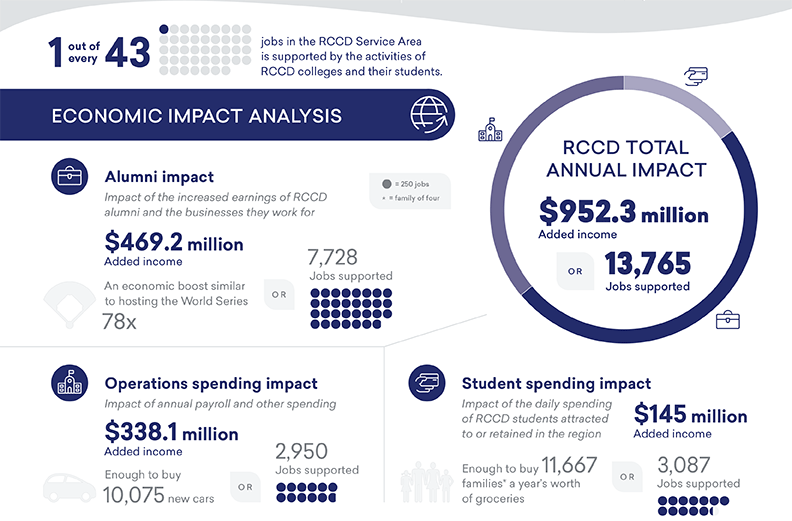Financial Impact of California Community Colleges is Felt from the Classroom to Industry
04/20/2022

In January, 2022, the California Community Colleges Chancellor's Office, with assistance from Emsi Burning Glass, a data company specializing in educational impact reporting, released an economic impact analysis of the 116 California community colleges. Per the report based on 2018-19 data, community colleges in the state added $128.2 billion in income to the state' s economy, or 4.2 percent of the total gross state product. In comparison, the researchers noted that the financial impact of the community college system is greater than the monies generated by the construction industry in the state of California.
Emsi Burning Glass, with headquarters in Moscow, ID, and Boston, MA, along with offices in the UK, Europe, India, and other global locations, uses data to measure economic prosperity and impact. EMSI Burning Glass clients include higher education, workforce development groups, and real estate entities.
Eleni Kounalakis, lieutenant governor of California and a member of the Board of Governors for California Community Colleges, and Eloy Ortiz Oakley, chancellor of the California Community Colleges, noted in their article that it was “heartening to confirm that the community college system, with 1.8 million students, is a wise investment for the state, taxpayers and our students." The California Community Colleges system is the largest educational system in the world.
Emsi Burning Glass estimated that for every dollar invested in community colleges California received back $11.70 in benefits. California's community colleges are said to generate job growth of nearly 1.5 million, or one out of every 16 jobs in the state. Just earning an associate degree will increase an individual's earning power by $11,000 over a holder of a high school diploma.
Riverside Community College District also recently worked with Emsi Burning Glass to complete an economic impact study for the District. The resulting reports, posted on the RCCD website, are significant and encouraging to the communities served by the District and its colleges - Moreno Valley College, Norco College and Riverside City College.
Sterling Smith, a consulting economist at Emsi Burning Glass who presented the District's report to the Board of Trustees, noted that the District generated $952 million in total income to the region, or 1.9 percent of the region's total Gross Regional Product (GRP). RCCD's buying power supported 13,765 jobs in the region, or one out of every 43.
Bill Hedrick, president of the RCCD Board of Trustees, commented that “this information should be the foundation of building our value to our communities. (Our colleges) are truly an asset, not just instructionally, but economically."
In 2019-20, RCCD, with 2,115 employees, paid out $265.7 million in payroll and benefits while generating $16.6 million in tuition revenue. Together, the colleges served nearly 67,000 students, awarding over 5,000 degrees.
“I know that the community realizes who we are and understands what we do, but I don't think the communities we serve comprehend the fiscal impact generated by the colleges, students and our alumni," Wolde-Ab Isaac, Chancellor of RCCD, said. “The bottom line is that our community colleges add significantly to the health of the communities we serve, from a well-trained workforce to augmenting the economic makeup of the Inland Empire. Our community college graduates rely less on government services than high school diploma holders and contribute more to the communities' tax base."
The report also indicated that the District generated an estimated billion dollars in higher future earnings for graduates, a return rate of 21.7 percent, Smith said. And, added from a taxpayer perspective, the benefit equaled $386.2 million in future tax revenue and government savings, or a 1.8 percent return.
“It is imperative that the District continues to encourage support locally for the colleges" Isaac said. “To meet the region's higher education needs, both Norco and Moreno Valley colleges and the Ben Clark Training Center need substantial facility growth; and Riverside City College, the oldest institution, requires campus-wide improvements in order to deliver comprehensive educational opportunities for the next generation of learners."
RCCD colleges are the leading educators of essential workers, such as nurses, fire, law enforcement, and logistics personnel in the Inland Empire. And many of the college graduates transfer to four-year institutions.
“The District's student return on investment is excellent and is one of the higher ones that we have seen," Smith said. “The results, I would say, are positive for students, and taxpayers are still having a surplus of monies generated through their investments (in the District)."
Published by External Relations & Strategic Communications

